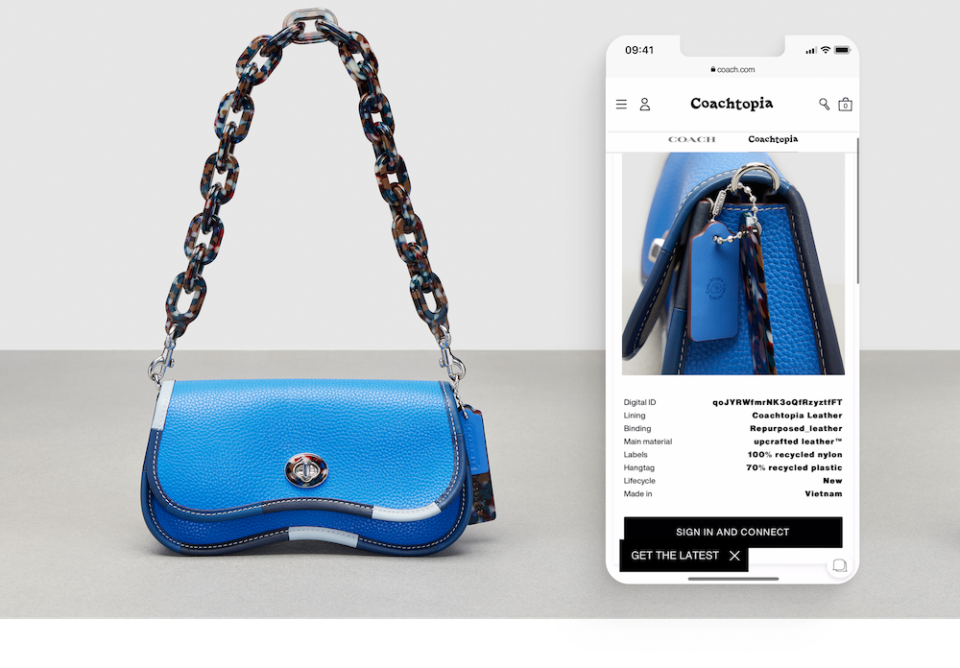How Coachtopia and EON are Redefining Retail with Connected Products

Legislation will soon require that all products have a Digital Product Passport (DPP) under initiatives such as the U.S. Digital Care Label and the EU’s Strategy for Sustainable and Circular Textiles. The goal of these DPPs is to provide a new level of transparency throughout the industry as they are able to store provenance and impact data for a product throughout its entire lifecycle. And while policy compliance will be the major impetus for the fashion industry to adopt DPPs and transparency initiatives, it shouldn’t be the only reason.
DPPs have tremendous commercial benefits as well, dramatically improving how brands sell products as well as how consumers buy, own and interact with them. By utilizing the Internet of Things (IoT) to bring the online world into every garment, brands can make every product traceable, intelligent and more valuable—for its entire lifespan.
More from Sourcing Journal
Tapestry's Joanne Crevoiserat: It Takes a Village to Scale Sustainability Practices
Avery Dennison Puts Digital Care Labels and Disposal Instructions in Swiss Performance Wear
Coach's Augmented Reality Partner Unveils Standalone AR Store
Combined with upcoming global regulations, the fashion industry is at a tipping point.
Adoption to connected technology is easier than ever, as consumers no longer need to download an app to retrieve data off a QR code or NFC chip; they only need to point their phone at it. In fact, in the U.S. alone, QR code adoption is expected to increase from 83.4 million users in 2022 to 99.5 million in 2025, according to Insider Intelligence.
The iconic fashion luxury house Coach has leaned into Digital ID technology this year, launching its new division, Coachtopia, that’s focused on circular and sustainable materials and craftsmanship. Working with EON, a cloud-based Digital ID platform, and using embedded NFCs on its upcycled product line, Coachtopia doesn’t need to worry about bar code tags or labels that might get removed after point of sale. Embedding connectivity, these “next-gen bar codes” contain information that is stored in the EON Product Cloud. That way, Coachtopia can continue to verify material and brand information—and authenticity—at all levels of use and resale, thus providing repeat revenue.
“With one Digital ID for every product, we can bridge the digital and physical — to increase the intelligence, sustainability and services associated with each item. We’re able to link important data about the origin and impact of materials to the associated physical item, as well as prove its authenticity and increase value on the secondary market,” said Joon Silverstein, Coach SVP global marketing, creative and sustainability and head of Coachtopia.
Silverstein will be speaking about retail’s next wave of smart, connected products and Coach’s role as an early adopter on the webinar “Digital Product Passports: Shaping the Future of Commerce” on Sept. 18. She will be joined by Natasha Franck, CEO and founder of EON, and Julie Brown, head of sustainability, EON.
“By introducing Digital IDs, brands can turn physical products into valuable assets that generate ongoing revenue, insights and customer relationships,” said Franck. “Products become channels to connect, sell and service. Brands that adopt will not only see higher product profitability and sustainable performance, they will also access invaluable real-world insights that enables them to better service and anticipate customer needs and unlock competitive advantage.”

Digital IDs don’t only hold product information, but they also include the social impact on how such products were made.
“In today’s fashion world, we’re so disconnected from the people, processes and impacts of the products we consume,” said Silverstein. “So at Coach, we’re going back into a lot of human storytelling around the people behind the product. It’s not just going back to show it’s this type of cotton from this type of farm. That is of course important in terms of traceability and transparency, but we’re also talking about going forward in terms of the future connections that are created.”
With this technology, when an embedded Coach product—be it apparel, handbags or footwear—comes back to the company to be resold or remade into something else, it retains the original NFC chip with its entire history, and gets recoded for whatever is new.
“Digital Product Passports will become the foundation to our circular economy, with policymakers now showing that this technology is no longer a ‘nice to have’ but instead will be a standard throughout the industry,” said Julie Brown, head of sustainability, EON. “They provide an opportunity to solve for the sustainability data gap that has made circularity a challenge for brands as they look to scale new and existing circular business models.”
To hear further discussion on this topic and to register for the webinar “Digital Product Passports: Shaping the Future of Commerce” on Sept. 18, 1 p.m. ET, click here.

